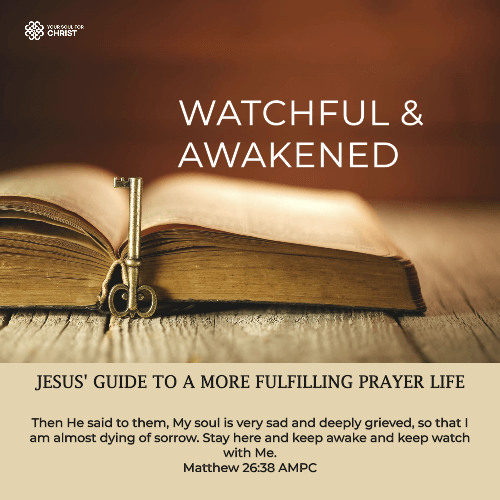Then He said to them, My soul is very sad and deeply grieved, so that I am almost dying of sorrow. Stay here and keep awake and keep watch with Me.
Matthew 26:38 AMPC
As the time approached for the Lord Jesus to face crucifixion, the Bible portrays his profound sorrow over the impending events, highlighting the significance of nurturing one’s prayer life. Jesus, not concealing His emotions, shared His distress with His disciples, revealing the depth of His anguish. In Matthew 26:38, He articulates his sorrow, expressing a level of grief that nearly overwhelms him.
Jesus, choosing Peter and the sons of Zebedee as companions, exemplified vulnerability by disclosing his inner turmoil. His visible distress underlines the intensity of his emotions, inviting empathy from those around him. This verse poignantly illustrates His emotional state, conveying the gravity of the moment for nurturing one’s prayer life.
However, amidst his sorrow, Jesus issues a crucial instruction to his disciples. He urges them to remain vigilant and keep watch with him while he retreats to pray. Despite inviting their presence, Jesus emphasises the importance of individual communion with God. He underscores the personal nature of seeking God by instructing them to stay behind.
Jesus’ directive to the disciples reveals the significance of seeking God and nurturing one’s prayer life on a personal level. While communal prayer has its place, Jesus emphasises the value of individual connection with God. His withdrawal to pray alone highlights the depth of intimacy possible in personal communion with God. We may mistakenly believe gathering large crowds during prayer compels God to answer. However, Jesus’ example demonstrates the significance of individual communion.
Moreover, Jesus’ instruction to “keep awake” underscores the necessity of alertness in prayer. He emphasises the need for spiritual vigilance, cautioning against spiritual lethargy or distraction. True communion requires active engagement, not passive slumber. Therefore, in the solemnity of prayer, wakefulness ensures earnest communion with God.
Furthermore, Jesus urges his disciples to “keep watch with me,” emphasizing mutual vigilance in prayer. His call to shared vigilance underscores the communal aspect of spiritual warfare and the importance of standing together in prayer.
“Keep watch” also carries a broader meaning. It signifies vigilance in our daily lives. Jesus, facing his ultimate trial, reminds us to be watchful. We must guard against the temptations and pitfalls the enemy throws our way. This includes protecting the gifts and talents God has entrusted to us, ensuring they are used for his glory. We must be alert to the enemy’s schemes to steal our blessings and hinder our spiritual growth.
The final point to consider is the nature of the “watching.” Jesus wasn’t asking the disciples to passively observe him. He asked them to watch with Him and not for Him. He was calling them to join Him in active watchfulness before God. They were to be present and engaged in their own prayer, mirroring Jesus’ devotion.
In conclusion, Matthew 26:38 offers profound insights into the dynamics of prayer and spiritual vigilance. Jesus’ vulnerability in expressing his sorrow demonstrates the depth of his humanity, while his instruction to his disciples underscores the personal nature of seeking God. As believers, we are called to emulate Jesus’ example, fostering both personal communion with God and communal vigilance in prayer. Let us, therefore, heed Jesus’ call to spiritual wakefulness and mutual watchfulness, engaging fervently in prayer and standing together in spiritual battles.
